外研版高中英语2004版必修三 module 3 the violence of nature 词汇强化练习 )
英语外研版必修3Module3《TheViolenceofNature》教案Period6

英语外研版必修3Module3《TheViolenceofNature》教案Period6Period 6Cultural Corner; Task; Module File整体设计教材分析本节课继续学习描述⾃然灾害, 阅读关于环太平洋地震带的⽂章, 了解历史上的两次⼤地震及其成因。
⿎励学⽣说出对这种危机的应对⽅式, 然后让学⽣在任务部分将⾃⼰的想法写下来。
最后通过总结练习来复习本模块所学的知识。
三维⽬标1. 知识与技能1)Make students master some new words.2)Broaden their visions with a passage about earthquakes.3)Instruct students to talk or write about a natural disaster.2. 过程与⽅法Encourage students to check what they have learned.3. 情感与价值Through the cultural corner students may have a better understanding of earthquakes as well as how to react in face of an earthquake.教学重点1. Train students’ reading skills: extensive reading, fast reading and cursory reading.2. Help students make notes about the great people’s important events in his life.3. Review the important points in this module.教学难点1. How to use the reading skills to deal with a passage, especially you need not to get the detailed information.3. Make students acquainted with the two biggest earthquakes around the Pacific Ocean in history.教学⽅法Skimming and explanationIndividual or pair work to make every student work in class教学过程→ Step 1 Revision(Greet students as usual. )1. Check their homework exercises.2. Ask a few students to act out their own dialogue.→ Step 2 Cultural CornerThe Cultural Corner is about earthquakes.As we all know, Tangshan once saw a very terrible earthquake.1. Lead-inA sample dialogue talking about the Tangshan earthquake:A: When do you know it was?B: My father told me that it was in 1976. Is that right?A: Yes. And did it cause much damage to the city?B: I think so. I often read some articles which are set in this earthquake. From the descriptionI know that it caused a great loss to our country as well as many casualties.A: How did our government react to this accident?B: I was told by my grandparents that the PLA men were sent to Tangshan city for the-stricken people.A: It’s true.2. Question:Do you think the Tangshan Earthquake was the worst earthquake ever in China?Read the article in Cultural Corner quickly and then you’ll find the answer.(Minutes later)Suggested answer:The most serious earthquake is not the Tangshan Earthquake but the Hua County Earthquake, which killed 60% of the population.3. Now read the article one more time and try to answer the following questions:(1)What was the most dangerous thing about the California Earthquake of 1906?(2)Is it possible that there could be another earthquake there?Suggested answers:1 The fires that started.2 Yes, there is.4. Discussion: (Option for higher students)Now just supposing there was an earthquake in your town, what would you do? You may discuss with your partner. (The teacher may have a brainstorm and collect the points of each group and then form a complete opinion of the whole class. After that students may write a short paragraph entitled What would I do if there were an earthquake in my town. )→ Step 3 TaskWork in pairs. Make a list of natural disasters that you can remember.(Give students a few minutes to prepare. )Find more information about natural disasters on the Internet or in magazines or books. Write down the information on your notebook.(The teacher may ask the groups to choose one of the types of disaster, and divide it into four different sections for the four members to do research, for example, how it is caused, where it happens in the world, where it happens in China, what theconsequences are. . . ) Make a presentation of your findings to the rest of the class. Use magazine photographs or photographs from the Internet to help.(Make students revise their contents according to the presentations of other students and try to write it into a written form. )A sample writing:A FloodThe heavy rain has been pouring down all the time for three days. Not only fields but also villages have been flooded. Last night, houses were washed away by the flood and the villagersover by steamboat. They did their best to save villagers and helped them to move onto the riverbank. Tents, food, clothes and medicine were sent to them without delay. Without the Partyand the PLA men, a large number of people would have lost their lives in the flood or died of hunger.→ Step 4 Module FileThis part can be used for students to check their understanding of this module by themselves, or students may revise what they have learnt with the help of this file.1. 根据句意及各题后括号中所给的汉语意思, 从下⾯的⽅框中选择合适的单词或词组, ⽤其适当形式填空。
外研版高中英语必修3Module3TheViolenceofNaturePeriod

外研版高中英语必修 3 Module 3 The Violence of Nature Period 5教学设计Period 5Cultural corner, Everyday English ,WritingTeaching Time:Teaching Goals:1.To get Ss to go over what they have learnt in this module.2.To write a passage about a natural event.Teaching Procedures:Step 1 : Pre-readingAnswer the following questions.Students’ activities1)Do you know the city of Tan Shan?2)What do you know about it?3)What happened to it in the year of 1976?4)Do you know other natural disasters?5)What damage do they cause?Step 2: While-readingRead the passage quickly and answer the following questions.Discussion1.Where was the worst Chinese earthquake? What kind of damage didit cause?2.What was the most dangerous thing about the California Earthquakeof 1906?3.Is it possible that there could be another earthquake there?4.How many earthquakes take place every day?5.What’ s the real reason causing the most damage in theCalifornia earthquake?6.What’ s the reason of the 1906 earthquake?Suggested answers:1.Hua County in Shaanxi Province in 1556. 60 percent of thepopulation were killed. 830,000 people lost their lives.2.the Fire.3. Yes.4.The fire caused by the earthquake did the most damage.1 / 35.the movement on the San Andreas Fault.Step 3:Post-readingDiscuss the following questions.1.Have you been told what to do if there was an earthquake?2.What would you do if there was an earthquake in your town?Step 4. Everyday English.a.answer the questions about these words.Luckily unfortunately thankfully Hopefully sadly fortunately1.Which of the words indicates that the following sentence containsgood news?2.Which indicates that the sentence contains bad news?Suggested answers:1. luckily; thankfully; hopefully, fortunately2. sadly unfortunatelyb. choose one of the words to complete these sentences.1._________, we had plenty of warning.2._________, there were several villages in its path.3._________, no one was killed.4. _________, it won’ t be too long.5._________, hundreds of houses caught fire when the lava reached them.6._________, we put all the fire out quite quickly.Suggested answers:1.Luckily; Thankfully; Fortunately2.Sadly Unfortunately3.Luckily; Thankfully; Fortunately4.Luckily; Thankfully; Hopefully, Fortunately5.Sadly Unfortunately6.Luckily; Thankfully; FortunatelyStep 5: Guided Writing1.Make a list of natural disasters that you can remember.2.Find more information on the Internet or other resources.3.Write about a violent natural event, using the phrases we have learnedin this module.Homework:1.Write a summary of the whole passage.2.Finish the other exercises of this module.2 / 3Teaching thought:3 / 3。
高一英语外研版必修3教案: Module3TheViolenceofNatu
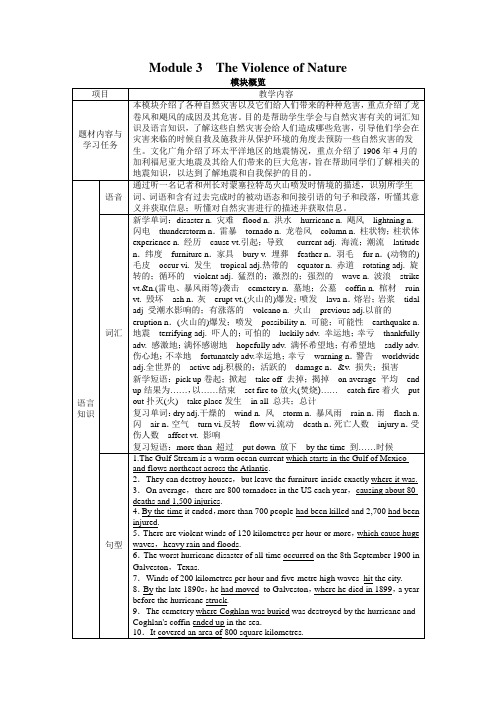
Module 3The Violence of Nature整体设计教学内容分析本模块的任务是学习了解自然灾害和它们所带来的危害和损失。
因此,每个课时都要以此为焦点。
第一课时包括三部分内容(Introduction & Function & Everyday English)。
第一部分帮助学生扩大词汇量。
学生在第一部分可以学到几种自然灾害的定义和一些事实。
第二部分是学习如何下定义。
第三部分是学习如何用相关副词表达好消息与坏消息。
总之,这一课时的重点是语言的训练,旨在帮助学生学会如何下定义和如何表达好消息和坏消息。
三维目标设计Knowledge and skills1.To help the students to learn the following words and expressions.Words:disaster,flood,hurricane,lightning,thunderstorm,tornado,column,experience,cause,volcano,earthquake,eruption,luckily,thankfully,hopefully,sadly,fortunately,warningExpressions:flashes of light,a column of air,a volcanic eruption,a plane crash,catch fire,put out2.To help the students to revise the following words and expressions in this period.Words:dry,wind,storm,rain,flash,air,turn,unfortunatelyExpressions:a lot of,plenty of3.To help the students to learn the vocabulary about disasters,such as flood,hurricane,lightning,thunderstorm,tornado,volcano,earthquake,etc.4.To help the students to learn how to give a definition.5.To help the students to learn some ways of expressing good news and bad news.Process and methods1.To encourage the students to describe the disasters they know about and correct possible mistakes they might make in a proper way by making necessary changes while repeating their sentences.2.To encourage the students to cooperate with others by working in pairs or in groups of four.3.To make sure that the students pay attention to the important points by asking them to repeat some of the teacher's statements.Emotion,attitude and value1.To encourage the students to know about the damages and losses caused by the natural disasters.2.To encourage the students to fight with natural disasters and learn to protect themselves and others from the natural disasters.3.To help the students to appreciate the advantage of cooperative learning.教学重点To help the students to learn to use the words,expressions and sentences in this period to describe some facts and express their opinions.教学难点1.To help the students to master some words about disasters.2.To help the students learn how to describe some natural disasters using related words.3.To help the students to express good news and bad news and give a definition.教学过程Lead-in 【3 min.】Brain stormingWork in groups.Show some pictures of several disasters to the students and ask the students to guess what types of disasters they are.Introduction—Vocabulary and speaking 【7 min.】Task 1Group workWork in groups.Ask the students to read the words in the box in activity 1,page 1 and then match them with their definitions.ANSWERS1)flood2)hurricane3)thunderstorm4)lightning5)tornadoTask 2Pair workAsk the students to practise the definitions with their partners.Function— Giving a definition 【7 min.】Get the students to work in pairs.Read the definitions in activity 1 again and give definitionsof the phrases in the box in activity 2,page 27,following the patterns.ANSWERS1)An earthquake happens when the earth shakes because of movement underground.2)A volcanic eruption is that lava and ash come out of a volcano.3)A plane crash is that a plane is flying when it crashes into the earth.Everyday English 【15 min.】Task 1Group workGet the students to work in groups.Read the words in the box in activity 1,page 28 and answer the questions about the words.ANSWERS1.luckily,thankfully,hopefully,fortunately2.unfortunately,sadlyTask 2Get the students to read the following dialogues and try to guess the meaning of the underlined words.1)Reporter:What exactly happened last week?Savage:Well,the volcano erupted,and ash and lava poured down the mountain toward the sea.Unfortunately,there were several villages in its path.2)Reporter:That's terrible.Was anybody hurt?Savage:No.Luckily,we had plenty of warning and I told people who lived in the path of the ash and lava.3)Reporter:Which areas are the most dangerous?Savage:Well,the most dangerous places are between the volcano and the sea.There are a lot of villages there.And it was very dangerous._Sadly,hundreds of houses caught fire when the lava reached them.Reporter:Oh,I'm very sorry to hear that.Savage:Thankfully,no one was killed.Reporter:Are the house still on fire?Savage:No.Fortunately,we put all fires out quickly.4)Reporter:OK—so that's the message from the governor—don't go back to your houses.When will you be able to return home?Savage:We don't know at the moment.Hopefully,it won't be too long.Task 3Choose one of the words to complete the sentences.ANSWERS1)Fortunately/Thankfully/Luckily2)Unfortunately/Sadly3)Fortunately/Thankfully/Luckily4)Hopefully/Fortunately/Thankfully/Luckily5)Unfortunately/Sadly6)Fortunately/Thankfully/LuckilyTask 4Write sentences about the tornado disaster with these words.Example:Hopefully,the police will find the missing man.1.Luckily...2.Fortunately...3.Unfortunately...4.Thankfully...5.Sadly...EXAMPLE SENTENCES1.Luckily,it didn't go through the middle of the village.2.Fortunately,the tornado only lasted a few minutes.3.Unfortunately,it destroyed many houses.4.Thankfully,rescue workers arrived within minutes.5.Sadly,three people were killed.Speaking 【10 min.】Work in pairs.Discuss the questions in Activity 2,Page 21.First,ask the two students to discuss the four questions and think about the possible answers.And then make an interview.One student is the interviewer and the other is the interviewee.The interviewer should refer to the four questions in activity 2,page 21 and also refer to other questions,such as:A:Hi,Tom!I'm Li Hua from China Daily.Remember the interview we've arranged yesterday?B:Oh,yes.You said on the phone that you would like to ask me some questions.A:Exactly.May I ask my first question now?B:Yes,please.A:Have you ever experienced a disaster,for example,a thunderstorm/a flood/a hurricane/a tornado?B:Sure.I have ever experienced a hurricane.A:What happened then?B:...Step 6Making a summary 【3 min.】Summarise the whole class.First,emphasis the ways of expressing good news and bad news.Then,emphasise the ways of giving a definition.HomeworkAsk the students to work in groups.Surf the Internet and write down some facts about one ofthe disasters mentioned in this period.教学参考Disasters come in many shapes and sizes.Most are related to the weather.Some are predictable(可预报的).Some,like an earthquake,surprise us.It's good for you to know about the different kinds of disasters so you can be prepared!Although disasters themselves aren't fun,learning about them is!Flooding happens during heavy rains,when rivers overflow,ocean waves come onshore or dams break.Flooding may be only a few inches of water or it may cover a house to its top.Floods that happen very quickly are called flashfloods.Flooding is the most common of all natural disasters.Earthquakes are the shaking,rolling or sudden shock of the earth's surface.Most of the time,you will notice an earthquake by the gentle shaking of the ground.You may notice hanging plants swaying or objects jumping on shelves.Sometimes you may hear a low noise or feel a sharp shake.A survivor of the 1906 earthquake in San Francisco said the sensation(感觉)was like riding a bicycle down a long flight of stairs.A tsunami is a series of huge waves that happen after an undersea disturbance,such as an earthquake or volcano eruption.The waves travel in all directions from the area of disturbance,much like the ripples(细浪,涟漪)that happen after throwing a rock.The waves may travel in the open sea as fast as 450 miles per hour.They can be as high as 100 feet.They can cause a lot of destruction on the shore.Thunderstorms happen in every state and every thunderstorm has lightning.Lightning can strike people and buildings,and is very dangerous.A typical thunder-storm is 15 miles in diameter(直径)and lasts an average of 30 minutes.Nearly 1,800 thunderstorms are happening at any moment around the world.。
外研版Book 3 Module 3 The Violence of Nature重要单词附答案

Book 3 Module 3 The Violence of NaturePeriod 1 Key words【课前预习】1.主题语境:本模块为“人与自然”主题下对“自然灾害与防范的探讨”。
文章介绍了龙卷风、飓风、地震等几种自然灾害,并描绘了人们在自然灾害中的经历和感受。
2.表达性技能:学会写一篇关于自然灾害的报道。
3.课时任务:通过阅读课文,了解龙卷风、飓风等自然灾害以及与飓风有关的奇怪事件,体会人们在经历自然灾害之后的感受,了解自然灾害的危害,提高自我保护和珍爱生命的意识。
【知识清单】一、[原文再现] Do you know anyone who has experienced one of the events? 你知道有谁经历过这些事件中的一件吗?experience vt. 经历;体验n. [C]经历;体验[U]经验常用搭配:experienced adj.有经验的;经验丰富的be experienced in在……方面有经验from / by experience 凭经验;从经验中full of experience 经验丰富have experience in在……方面有经验get / gain experience 获得经验1.What I saw was completely unlike anything I had experienced in the past.我所看到的完全不同于我过去所经历的。
2.She wants to know why her grandfather never spoke about his experiences in World War II.她想知道为什么祖父从不谈起他自己在第二次世界大战时的经历。
3.In the early days, she moved jobs to get experiences. 起初她通过换工作来获得经验。
4.I have experience in checking information from printed sources and from interview.我有从印刷资料及采访中校验信息的经验。
外研版高中英语必修3《module3theviolenceofnature》word教案
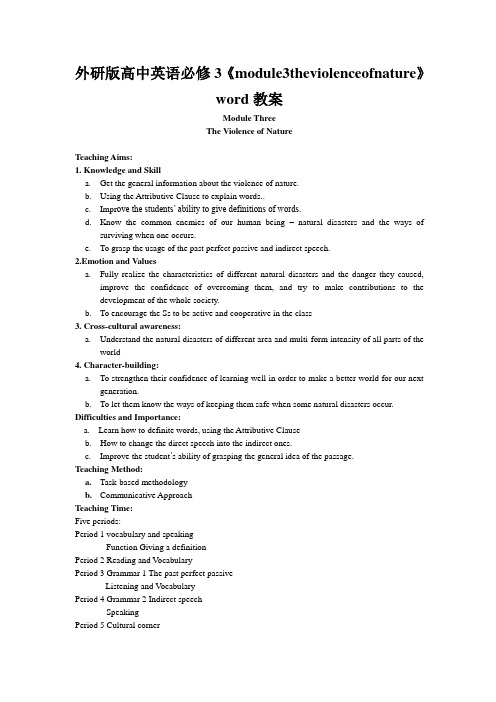
外研版高中英语必修3《module3theviolenceofnature》word教案Module ThreeThe Violence of NatureTeaching Aims:1. Knowledge and Skilla.Get the general information about the violence of nature.ing the Attributive Clause to explain words..c.Impr ove the students’ ability to give definitions of words.d.Know the common enemies of our human being –natural disasters and the ways ofsurviving when one occurs.e.To grasp the usage of the past perfect passive and indirect speech.2.Emotion and Valuesa.Fully realize the characteristics of different natural disasters and the danger they caused,improve the confidence of overcoming them, and try to make contributions to the development of the whole society.b.To encourage the Ss to be active and cooperative in the class3. Cross-cultural awareness:a.Understand the natural disasters of different area and multi-form intensity of all parts of theworld4. Character-building:a.To strengthen their confidence of learning well in order to make a better world for our nextgeneration.b.To let them know the ways of keeping them safe when some natural disasters occur. Difficulties and Importance:a. Learn how to definite words, using the Attributive Clauseb. How to change the direct speech into the indirect ones.c.Improve the student’s ability of grasping the general idea of the passage.Teaching Method:a.Task-based methodologymunicative ApproachTeaching Time:Five periods:Period 1 vocabulary and speakingFunction Giving a definitionPeriod 2 Reading and V ocabularyPeriod 3 Grammar 1 The past perfect passiveListening and V ocabularyPeriod 4 Grammar 2 Indirect speechSpeakingPeriod 5 Cultural cornerEveryday EnglishWritingTeaching Procedures:Period 1Step 1. Warming upLook at the picture and answer the following questions.Q1. Have you ever heard of the tsunami in 2004?Q2. When and where did it happen?Q3. What kind of damage did it cause?Q4. Can you list some of other natural disasters?Q5. Tsunamis are natural occurrences. Can humanbeings stop them?Suggested answers:Q1. Yes.Q2. At the end of 2004, a massive earthquake sent tsunami smashing into Indian Ocean coastline. Many heavily populated areas disasters from it.Q3. Sri Lanka , Indonesia , Thailand , India, Malaysia and East Africa destroyed by the monster waves, causing millions of deaths.Q4. Flood, Fire, drought, landslide, earthquake, tornado, hurricane and so on.Q5. No. Tsunamis are a natural occurrence related to the processes that shape the Earth's surface—earthquakes, volcanoes, and landslides. These processes are driven by the heat escaping from the Earth and gravity, and people cannot control these underlying forces.Step 2. V ocabulary LearningMatch the words in the box with their definitions.Flood hurricane lightning thunderstorm tornado1. a lot of water in an area which is usually dry2. a very strong wind or storm3. a lot of rain falling quickly, with loud noises and flashes of light4.the flash of light which happens during a thunderstorm5. a column of air that turns very quickly.Suggested answers:A flood is a lot of water in an area which is usually dry.A hurricane is a very strong wind and storm.Lightning is the flash of light which occurs during a thunderstorm.A thunderstorm is a lot of rain falling quickly, with loud noises and flashes of light.A tornado is a column of air that turns very quickly.Step 3 FunctionTry to find the common characteristic of the sentences above.Suggested answers:➢Each sentences gives a definition of a word.➢The Attributive Clause appears in each sentence.➢When we give a definition of a word, the Attributive Clause is usually necessary and hopeful.We’d better learn to use the structure “A is B that/which”Step 4 PracticeGive definitions of the words following the pattern “A is B that/which”.An earthquake a volcanic eruption a plane crashSuggested answers:1.An earthquake happens when the earth shakes because of movement underground.2. A volcanic eruption is that lava and ash coming out of a volcano.3. A plane crash is that a plane stopping flying and crashing into the earth.Step 4 Discussions4.Which kind of these natural disasters have ever experienced? Can you describe it?5.Have you ever read a news story about one of the events? Can you describe it?6.Do you know anything about the events? For example, what causes them? Homework:1.Surf the Internet in order to have a better understanding of natural disasters.2.Preview the passage in Reading and V ocabulary.Period 2Step 1 Pre-readingRead about the Gulf Steam and check the meaning of the words:1, What is a current ?(a) A kind of electricity (b) A movement of water(c) A kind of wind2, What kind of things flow ?(a) Water (b) Time (c) Money3, If two places are on the same latitude ,they are on the same line _____(a) east/west(b) north/southSuggested answers:b. a . aStep 2. While-readinga.SkimmingRead the passage quickly and silently. Find the words and expressions in the passages and match them with the definition.bury disaster feather fur occur tropical1 you can see this on an animal __________2 describing the hottest parts of the earth, north and south of the equator__________3 a terrible event _________4 you can see these on a bird _________5 to place in the ground or tomb ___________6 to happen __________Suggested answers:1.fur2. tropical3. disaster4. feather5. bury6. occurb. Detailed-readingRead the passage carefully and answer the following questions.1.How strong are tornado winds?2.What can happen to furniture when a house is destroyed by a tornado?3.How many tornadoes are there in the US every year?4.How many people died in the worst tornado of all time?5.What happens at sea during a hurricane?6.When was the worst hurricane of all time?7.Was the actor Charles Coghland killed in it?8.What happened to him after the hurricane?Suggested answers:1. More than 400 km/h.2. It stays where it was.3. About 800.4. More than 700.5. It has huge waves.6. 8th September, 1900.7. No, he wasn’t.8. His coffin was dropped in the sea by a hurricane and carried to Canada by the Gulf Stream. Step 3 Post-readingStep 4 Language Explanations【词条1】occur【课文原句】Almost all of them occur in the US, in the area from Texas in the southeast to South Dakota in the north. (Page23)【点拨】occur此处意为“发生”,不及物动词,没有被动语态。
外研版高一必修三 Module3 TheViolence of Nature
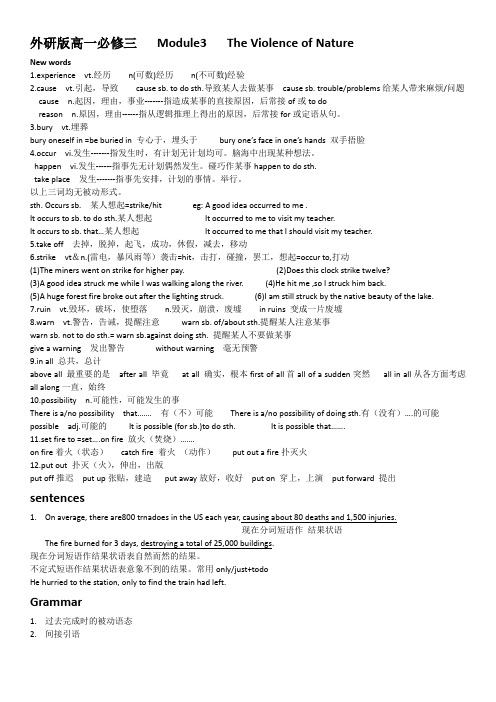
外研版高一必修三Module3 The Violence of NatureNew words1.experience vt.经历n(可数)经历n(不可数)经验2.cause vt.引起,导致cause sb. to do sth.导致某人去做某事cause sb. trouble/problems给某人带来麻烦/问题cause n.起因,理由,事业-------指造成某事的直接原因,后常接of或to doreason n.原因,理由------指从逻辑推理上得出的原因,后常接for或定语从句。
3.bury vt.埋葬bury oneself in =be buried in 专心于,埋头于bury one’s face in one’s hands 双手捂脸4.occur vi.发生-------指发生时,有计划无计划均可。
脑海中出现某种想法。
happen vi.发生------指事先无计划偶然发生。
碰巧作某事happen to do sth.take place 发生-------指事先安排,计划的事情。
举行。
以上三词均无被动形式。
sth. Occurs sb. 某人想起=strike/hit eg: A good idea occurred to me .It occurs to sb. to do sth.某人想起It occurred to me to visit my teacher.It occurs to sb. that…某人想起It occurred to me that I should visit my teacher.5.take off 去掉,脱掉,起飞,成功,休假,减去,移动6.strike vt&n.(雷电,暴风雨等)袭击=hit,击打,碰撞,罢工,想起=occur to,打动(1)The miners went on strike for higher pay. (2)Does this clock strike twelve?(3)A good idea struck me while I was walking along the river. (4)He hit me ,so I struck him back.(5)A huge forest fire broke out after the lighting struck. (6)I am still struck by the native beauty of the lake.7.ruin vt.毁坏,破坏,使堕落n.毁灭,崩溃,废墟in ruins 变成一片废墟8.warn vt.警告,告诫,提醒注意warn sb. of/about sth.提醒某人注意某事warn sb. not to do sth.= warn sb.against doing sth. 提醒某人不要做某事give a warning 发出警告without warning 毫无预警9.in all 总共,总计above all 最重要的是after all 毕竟at all 确实,根本first of all首all of a sudden突然all in all从各方面考虑all along一直,始终10.possibility n.可能性,可能发生的事There is a/no possibility that……. 有(不)可能There is a/no possibility of doing sth.有(没有)….的可能possible adj.可能的It is possible (for sb.)to do sth. It is possible that…….11.set fire to =set….on fire 放火(焚烧)…….on fire着火(状态)catch fire 着火(动作)put out a fire扑灭火12.put out 扑灭(火),伸出,出版put off推迟put up张贴,建造put away放好,收好put on 穿上,上演put forward 提出sentences1.On average, there are800 trnadoes in the US each year, causing about 80 deaths and 1,500 injuries.现在分词短语作结果状语The fire burned for 3 days, destroying a total of 25,000 buildings.现在分词短语作结果状语表自然而然的结果。
外研版高中英语必修3Module3TheViolenceofNaturePeriod3教案
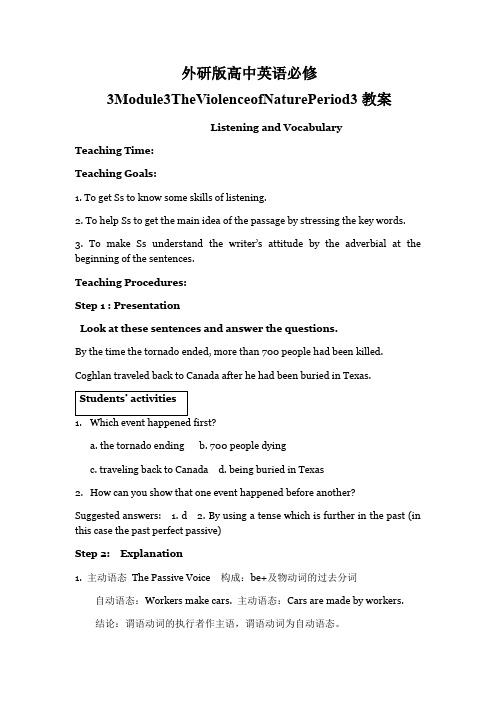
外研版高中英语必修3Module3TheViolenceofNaturePeriod3教案Listening and VocabularyTeaching Time:Teaching Goals:1. To get Ss to know some skills of listening.2. To help Ss to get the main idea of the passage by stressing the key words.3. To make Ss understand the writer’s attitude by the adverbial at the beginning of the sentences.Teaching Procedures:Step 1 : PresentationLook at these sentences and answer the questions.By the time the tornado ended, more than 700 people had been killed.Coghlan traveled back to Canada after he had been buried in Texas.a. the tornado endingb. 700 people dyingc. traveling back to Canadad. being buried in Texas2.How can you show that one event happened before another?Suggested answers: 1. d 2. By using a tense which is further in the past (in this case the past perfect passive)Step 2: Explanation1. 主动语态The Passive Voice 构成:be+及物动词的过去分词自动语态:Workers make cars. 主动语态:Cars are made by workers.结论:谓语动词的执行者作主语,谓语动词为自动语态。
外研版高中英语必修三模块3说课稿
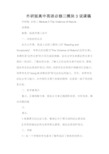
外研版高中英语必修三模块3说课稿外研版必修三Module 3 The Violence of Nature说课稿焦燕,临清市第三高中一、对教材的认识此次公开课,我选上必修三模块三的“ Reading and Vocabulary”。
本单元的话题为“The Violence of Nature”(自然灾害)。
本课时是“自然灾害”的介绍及阅读理解,旨在让学生掌握自然灾害方面的一些词汇,了解自然灾害,了解人们在自然灾害中的经历、感受,提高学生的自我保护意识;同时,训练学生在语境中理解词汇的能力,培养学生对“doing做结果状语”等句法的运用能力。
另外,培养学生的自主学习能力、合作探究及勇于质疑的精神,也是我一成不变的教育目标。
二、教学重难点重点:正确理解文章,提高从文章正确提取信息、分析信息、解决问题的能力。
难点:1.掌握课文的主旨大意,整理出关于课文结构的主要信息.2.用英语描述自然灾害和表达感受,提高自我保护意识。
三、学情1)高一下学期的学生基本了解和适应了新教材的特点;2)经过开学一个月的演练,自主学习习惯正在养成;3)对事物有好奇心,思维活跃,但思考不深入,逻辑性不强;4)生活历练少,心理承受力弱,缺少应对突发事件的知识和勇气。
四、教学理念本节公开课录制时,我校已试行“二二五”课堂教学一个月。
“二二五”课堂教学旨在通过导学案给学生创设问题情景,充分调动学生的积极性,先让学生自主学习,成为问题的“发现者”,然后与小组成员进行合作性的探究,再由学生自行展示学习成果。
课堂前20分钟为学生提供一个展示与自由辩论交流技能的平台;再用20分钟进行巩固性训练,强化学习成果;最后5分钟布置作业和预习任务。
“二二五”课堂教学打破了常规的课堂教学模式,形成一个由课下预习、课上展示演练和课下巩固组成的“大课堂”,使学生的学习过程在课上和课下形成一个有机循环。
其目是培养学生的自主学习能力,鼓励学生大胆展示自我,学生之间既有合作探究又有激烈辩论,同时提高学习能力和人际交往能力。
高一英语外研版必修3教案: Module3TheViolenceofNatu
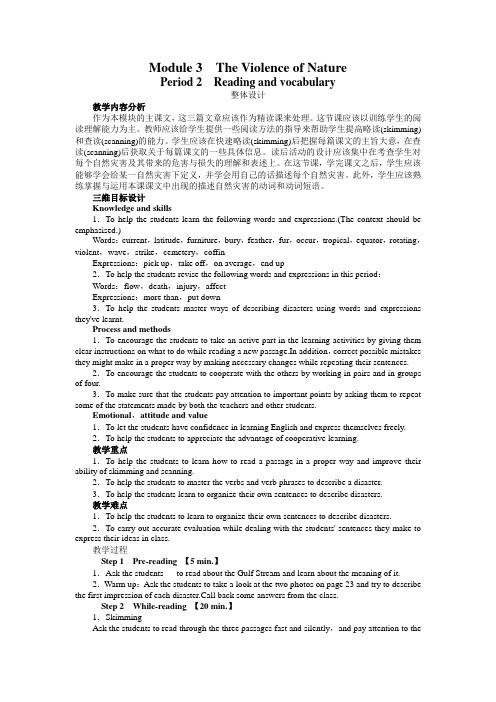
Module 3The Violence of NaturePeriod 2Reading and vocabulary整体设计教学内容分析作为本模块的主课文,这三篇文章应该作为精读课来处理。
这节课应该以训练学生的阅读理解能力为主。
教师应该给学生提供一些阅读方法的指导来帮助学生提高略读(skimming)和查读(scanning)的能力。
学生应该在快速略读(skimming)后把握每篇课文的主旨大意,在查读(scanning)后获取关于每篇课文的一些具体信息。
读后活动的设计应该集中在考查学生对每个自然灾害及其带来的危害与损失的理解和表述上。
在这节课,学完课文之后,学生应该能够学会给某一自然灾害下定义,并学会用自己的话描述每个自然灾害。
此外,学生应该熟练掌握与运用本课课文中出现的描述自然灾害的动词和动词短语。
三维目标设计Knowledge and skills1.To help the students learn the following words and expressions.(The context should be emphasised.)Words:current,latitude,furniture,bury,feather,fur,occur,tropical,equator,rotating,violent,wave,strike,cemetery,coffinExpressions:pick up,take off,on average,end up2.To help the students revise the following words and expressions in this period:Words:flow,death,injury,affectExpressions:more than,put down3.To help the students master ways of describing disasters using words and expressions they've learnt.Process and methods1.To encourage the students to take an active part in the learning activities by giving them clear instructions on what to do while reading a new passage.In addition,correct possible mistakes they might make in a proper way by making necessary changes while repeating their sentences.2.To encourage the students to cooperate with the others by working in pairs and in groups of four.3.To make sure that the students pay attention to important points by asking them to repeat some of the statements made by both the teachers and other students.Emotional,attitude and value1.To let the students have confidence in learning English and express themselves freely.2.To help the students to appreciate the advantage of cooperative learning.教学重点1.To help the students to learn how to read a passage in a proper way and improve their ability of skimming and scanning.2.To help the students to master the verbs and verb phrases to describe a disaster.3.To help the students learn to organize their own sentences to describe disasters.教学难点1.To help the students to learn to organize their own sentences to describe disasters.2.To carry out accurate evaluation while dealing with the students' sentences they make to express their ideas in class.教学过程Pre-reading 【5 min.】1.Ask the students to read about the Gulf Stream and learn about the meaning of it.2.Warm up:Ask the students to take a look at the two photos on page 23 and try to describe the first impression of each disaster.Call back some answers from the class.While-reading 【20 min.】1.SkimmingAsk the students to read through the three passages fast and silently,and pay attention to thefirst sentence of each passage.Give them suggestions that they should focus on the general idea and not on the detailed meaning.Check the main idea of each passage with the whole class.2.Scanning1.Get the students to read the third passage again and retell the story according to the following key words and time clue.born→lived→moved→By the late 1890s→In 1899→In 1900→destroyed→ended up in→wa s found2.DiscussionGet the students to work in groups of four and discuss the following two questions according to the instructions.Instructions :From this class ,we have learnt the bad results of the natural disasters ,including the tornado and the hurricane.We have felt the violence of nature.Everybody wants a better place to live.But we can't tell nature to do what we want it to.In fact ,one of the causes of the natural disasters is the problem of global warming.Please have a group discussion and try to discuss the following questions.1)What's your idea about the problems that nature brings to us.________________________________________________________________________2)Faced with so many problems ,what can we do?________________________________________________________________________Language study 【8 min.】1.Punctuate the following paragraph and translate it ,paying attention to the underlined words or phrases.tornadoes can pick_up cars trains and even houses and put them down in the next street or even in the next town they can_take the fur off the back of a cat and the feathers off_a chicken they can destroy houses but leave the furniture inside exactly where it was2.Read the following sentences and write down the meaning of pick up in each sentence.1)Tornados can pick up cars ,trains and even houses.______2)The boy picked up the hat for the old man.______3)He picked up French while he stayed in Paris.______4)Can you do me a favor to pick up my daughter from school ?______5)He picked up some used stamps.______3.Read the following sentences and tell the common use of the underlined words.1)The worst hurricane disaster of all time occurred_on the 8th September 1900 in Galveston ,Texas.2)Winds of 200 kilometres per hour and five-metre high waves hit the city.3)By the late 1890s,he had moved to Galveston,where he died in 1899,a year before the hurricane struck.4.Translate the sentence using the three words occur,hit and strike.2008年5月12日,汶川发生了可怕的大地震。
教案1高中英语外研版必修3Module3TheViolenceofNature
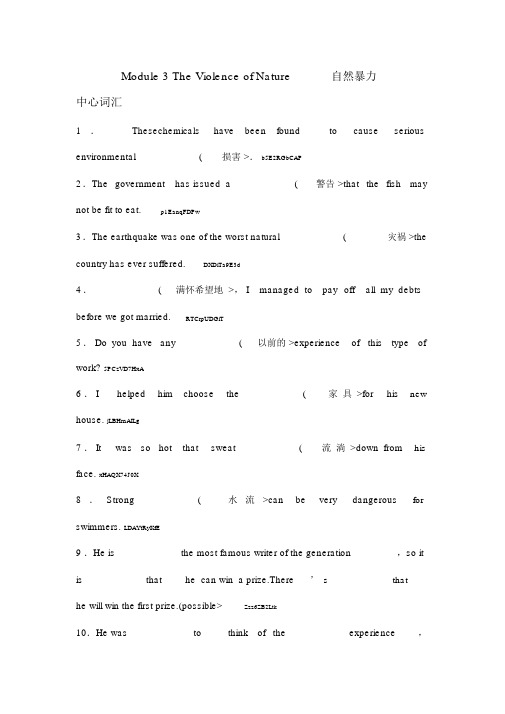
Module 3 The Violence of Nature自然暴力中心词汇1 .Thesechemicals have been found to cause serious environmental____________( 损害 >.b5E2RGbCAP2 .The government has issued a____________( 警告 >that the fish may not be fit to eat. p1EanqFDPw3 .The earthquake was one of the worst natural____________( 灾祸 >the country has ever suffered. DXDiTa9E3d4 . ____________( 满怀希望地 >, I managed to pay off all my debts before we got married. RTCrpUDGiT5 . Do you have any____________( 以前的 >experience of this type of work? 5PCzVD7HxA6 . I helped him choose the____________(家具>for his new house. jLBHrnAILg7 . It was so hot that sweat____________(流淌>down from his face. xHAQX74J0X8.Strong____________(水流>can be very dangerous for swimmers. LDAYtRyKfE9 .He is ____________the most famous writer of the generation,so it is____________that he can win a prize.There’ s ____________thathe will win the first prize.(possible>Zzz6ZB2Ltk10.He was ____________to think of the____________experience,which ____________him.(terrify>dvzfvkwMI11.damage2.warning3.disasters4.Hopefully5.previous6.furniture7.poured8.cur rents9.possibly;possible;possibility10.terrified;terrifying;terrified rqyn14ZNXI高频短语1.________________ 卷起;掀起;拿起,捡起,拾起2 .________________ 记下;放下3.________________ 脱下,去 ( 拿>掉4 .________________ 平均起来,一般说来5 .________________ 到时为止6 .________________ 以结束 / 结果为7 .________________ 使着火;放火烧8 .________________ 着火9 .________________ 扑灭;熄灭;伸出10.________________ 发生11. ________________ 总计,合计12.________________ 失去生命1.pick up2.put down3.take off4.on(the>average5.by the time6.end up7.set fire to sth.8.catch fire9.put out 10.take place 11.in all 12.lose one ’s life EmxvxOtOco重点句式1.They can destroy houses ,but________the furniture inside exactly________________.SixE2yXPq5它们能毁掉房屋,却把房内的家具留在原处。
高中英语外研版必修三Module 3 The Violence of Nature教案

Module3 The Violence of Nature一、教材分析1. 话题:本阅读课是围绕整个单元的中心话题“The Violence of Nature”而展开的。
2. 内容:本文描述了龙卷风和飓风这两大自然灾害爆发的时间、地点、情形、经过、最后的结果、造成的危害、人员财产损失的情况。
最后以Charles Coghlan 的经历讲述了一个与飓风有关的离奇故事。
3. 目标:①扫清课文中出现的生词障碍;②理解课文内容,理清篇章的组织脉络;③引导学生学会根据主题理解文章细节的能力和根据关键词复述课文的能力。
二、教学实践1.教学步骤step 1. Warming up1)以introduction 部分的图片入手,引出本课关于自然灾害的词汇,然后用brainstorm的形式让学生快速想出相关词汇。
2) Discussion: Have you ever experienced such an event or read a news story about one of the events? Can you describe it? 让全班学生两人一组互相讲述自己的经历,有利于激发学生说的兴趣,在学生的相互交流中培养起发现问题和解决问题的能力,然后让个别学生起来展示,培养学生的自信心和表达能力,同时也自然过渡到了本节主题。
Step 2. Reading1)Skimming 快速阅读全文,理清大意;2)Scanning ①细读文章,回答part2 的问题。
提问学生展示答案,针对有问题的答案让学生讨论后再做纠正,培养其自主解决问题的能力。
②然后再从definition,speed,phenomena and worst event 几个方面比较tornado and hurricane的不同之处,旨在培养学生理解细节和提取信息的能力。
3)Exercise 进一步加强学生对文章的理解。
Step 3. Post-readingRetell the passage.组织学生重述课文内容来加强学生对全文的理解,同时也锻炼了学生的口语能力。
英语外研版必修3Module3《The Violence of Nature》教案Period 3

Period 3Grammar 1; Listening and Vocabulary整体设计教材分析本节学习过去完成时的被动语态。
学生可以先分析句子结构总结该语法点的句型结构。
教师可以通过提供一些练习题来让学生巩固所学的内容。
听力部分是一个关于火山爆发的采访, 学生可以先预习词汇然后根据题目听内容。
三维目标1. 知识与技能1)Make students learn some grammatical rules themselves.2)Make sure students master the grammatical items.3)Train students’ listening ability.2. 过程与方法1)Motivate students’ enthusiasm in taking part in the class.2)Help students to use the sentence patterns in communication.3. 情感与价值Through the study of this period students will surely know more about the tenses and voices of verbs. What’s more, they may know more about the natural disasters.教学重点1. Train students’ ability of listening.2. How to use the sentence patterns in daily life.教学难点Make students understand the tenses and voices of verbs.教学方法Individual work and pair work to make every student work in class.教学过程→ Step 1 RevisionHave a dictation of the words and useful expressions learnt in the text last class:current, latitude, furniture, bury, feather, fur, occur, tropical, equator, rotating, violent, wave, strike, cemetery, coffin→ Step 2 GrammarIn this period we are going to talk about the Past Perfect Passive.First look at the sentences and then answer the following questions.By the time the tornado ended, more than 700 people had been killed.Coghlan traveled back to Canada after he had been buried in Texas.1. Which event happened first?(a)the tornado ending(b)700 people dying(c)traveling back to Canada(d)being buried in Texas2. How can you show that one event happened before another?Suggested answers:1. d2. By using a tense which is further in the past(in this case the past perfect passive)Now students have known more about the past perfect passive.Do some exercises to consolidate it.(Show the following sentences on the screen. )Choose the correct tense and voice to complete each sentence.Example: The survivors of the earthquake were the ones who stayed(stay)in the village1. After the hurricane, Mary_____________ (see)that the roof of her house _____________ (disappear).2. She_____________ (return)home and_____________ (find) all her furniture _____________ (ruin)by the flood.3. Arthur was surprised when he_____________ (arrive)home because the tornado _____________ (take)the feathers off his chickens.4. We_____________ (leave)the house when the thunderstorm_____________ (finish).5. He_____________ (try)to drive back to his home before the flood _____________ (pass)through the village.Suggested answers:1. saw; had disappeared2. returned; found; had been ruined3. arrived; had taken4. left; had finished5. tried; passedPlease complete these sentences with the verbs form the box. Use the past perfect(Show the following on the screen. )destroy die fall flood kill1. After the earthquake, they discovered that several people_____________ .2. When the hurricane ended, several buildings in the town_____________ .3. His village_____________ in the heavy rain, so he moved to his par ents’ house.4. When she woke up, she found that her house_____________ by the thunderstorm.5. Arthur was unhappy because some of his animals_____________ .(Ask students to answer the questions. )Suggested answers:1. had been killed/had died2. had been destroyed/had fallen down3. had been flooded/had been destroyed4. had been destroyed5. had died/had been killed→ Step 3 Listening and V ocabularyFirst let students read the words in the table after the teacher.ash erupt lava tidal wave volcanoThen locate the above words in the short passage and try to make sense of them.Suggested answers:ash: paragraph 3 line 1.erupt: erupted: paragraph 2 line 1; eruption: paragraph 2 line 3lava: paragraph 3 lines 2 and 3tidal wave: paragraph 3 lines 4-5volcano: volcanoes: paragraph 1 line 3, paragraph 2 line 1, volcano: paragraph 2 line 2, paragraph 3 lines 2 and 3Now that students have a better understanding of the passage, ask them to work out the connections between the words in Activity 1.Sample sentence:I guess when a volcano erupts, three of the outcomes are ash, lava and tidal waves.The topic in this module is natural disasters. The listening material is also about acity Plymouth.Before the listening answer these questions:1. Ash and lava poured down the mountain, setting fire to hundreds of houses.Does this mean that(a)a fire started or(b)a fire ended?2. Hundreds of houses caught fire when the lava reached them.Does this mean that the fire started because of(a)a person or(b)a natural event?3. We managed to get half the population to another island.Does this mean it was(a)an easy thing to do or(b)a difficult thing to do?4. We put all the fires out.Does it mean the fires(a)are still burning or(b)have finished?Suggested answers:1. a2. b3. bActivity 4(Play the tape for students to finish Activity 4. )Listen to the tape and then answer the following questions:1. Where are they?2. Who are the two people in the conversation?3. Is a volcanic eruption taking place now?4. How many people have already left the island?5. How many people were killed by the eruption?6. When will people be able to return to their homes?Suggested answers:1. In the centre of Plymouth, capital of Montserrat.2. A reporter and Frank Savage, Governor of the island.3. N o, it isn’t.4. About 6000.5. None.6. They don’t know.→ Step 5 Summary and HomeworkPassive. What’s more, they have practiced their listening skills.Homework:用动词适当的形式填空1. By the time the tornado ended, more than 700 people_____________ (kill).2. Coghlan travelled back to Canada after he_____________ (bury)in Texas. 答案: 1. had been killed 2. had been buried板书设计Module 3The Violence of NaturePeriod 3 Grammar 1; Listening and V ocabularyBy the time the tornado ended, more than 700 people had been killed. Coghlan travelled back to Canada after he had been buried in Texas.1. Which event happened first?2. How can you show that one event happened before another?活动与探究1. Learn how to use the Past Perfect Passive correctly.2. Practice listening skills.。
新课标外研社版高中英语必修三单元语言点讲解(Module3_The_Violence_of_Nature)

Moduel 3 The Violence of Nature 语言点1.disaster n. 灾害,灾难,不幸a natural disasterWe were all shocked by the disaster. 这场灾难使我们所有人大为震惊。
A disaster movieOur plan ended in disaster. 我们的计划以彻底失败告终。
disastrous adj 灾难性的;损失惨重的a disastrous mistake 招致大祸的错误disastrous results2. flood n.1. 洪水,大水;水灾2.. [the Flood(或Noah's Flood)]灭世洪水(挪亚时期遭受的大洪水)vt.1. 淹没;(雨水)使泛滥;使涨满水;从…中溢出:The river has flooded the meadows.河水淹没了草地。
The river is flooded by the rains.雨水使河水泛滥。
2. (洪水般)淹没;涌至,涌进:roads flooded with cars挤满了汽车的道路3. 充满,充斥;压倒;涌满:Music flooded the room.音乐充满了整个房间。
vi.1. 为水所淹;溢出;(潮水)上涨;泛滥:During spring rains the river floods.在春天的雨季,这条河河水泛滥。
2. (洪水般)流;涌进;充斥:When I drew the curtains back the sunlight flooded in.我拉开窗帘,阳光泻进房间。
Applications flooded in.申请书大量涌来。
3.experience n.1. (个人的)经验;体验2. 阅历(共同的)经历(或遭遇)vt. 1. 有…的经验;感受;遭受;经受,经历;体验:to experience nausea感到晕船to experience pleasure感到愉快2. 发现,通过亲身经历认识到,体验到:I have experienced that the sunrise can be so beautiful.我发现日出真美。
高中英语Module 3 The Violence of Nature外研版必修三

1/1
word
Module 3The Violence of Nature
话题介绍
Period 1Reading Period 2 Grammar Period 3 FUNCTION
教学设计说明 本模块主题是“The Violence of Nature〞,译作“自然的暴力〞。自然对我 们更多的是宽恕,但她也严格地惩罚过我们。1998 年的洪灾、威胁的沙尘暴、 2003 年的“非典〞等,恐怕是她给我们的警钟。大自然是无私的,她的怒火是 责怪人类的不孝,因为她明白,人类不能没有她,人类也必须懂得孝敬她,与 她谐和相处。 人类应该视自然为母亲,也应该视她为儿女。将有限的资源力量化为无限的资 源力量是人类谋求自我生存发展的最正确出路,而这一出路的给予者就是大自 然,爱护大自然实质就是人类爱护自己的一种方式。 INTRODUCTION Vocabulary and speaking 和 READING AND VOCABULARY 合并为第 一课时“阅读课。〞课文“What Is a Tornado?… 〞前两篇属说明文体,介绍了自然界的两种暴力形式:龙卷风和飓风。第三篇 是记叙文,讲述 Charles Coghlan 死后的奇异经历。 课本 24 和 26 页合并为第二课时“语法课〞,学习 The past perfect passive and Indirect speech。 课本 27 页为“功能课〞,学习如何 Giving a definition。
Period 4 Wபைடு நூலகம்iting
Period 5 Speaking
Period 6 CULTURAL CORNER Period 7 TASK
课本 28 页“Writing〞为“写作课〞,学习 how to writeabout a violent natural event。 28 页 EVERYDAY ENGLISH 扩展为“口语课〞,引导学生进行课本剧表演、或者 putting the text into a dialogue。 课本 29 页的 CULTURE CORNER 是“文化阅读课〞,EARTHQUAKE AROUND THE PACIFIC 介绍环太平洋地区暨中国地区的地震灾害。 课本 30 页的 TASK 是“任务课〞,学习用英文编撰或谈论自然灾害。
英语外研版必修3Module3《The Violence of Nature》教案Period 1

Module 3The Violence of Nature单元规划话题任务 1. Talking about natural disasters.2. Writing or talking about a violent natural event.3. Learn to give a definition.教学重点单词disaster(灾难); flood; hurricane; lightning; thunderstorm; tornado; column;experience(经历); cause(引起; 导致); current; latitude; furniture; bury; feather; fur;occur(发生); tropical; equator; rotating; violent; wave; strike(雷电、暴风雨等袭击);cemetery; coffin; ruin; ash; erupt(火山的爆发; 喷发); lava; tidal; volcano; previous;eruption; possibility; earthquake; terrifying; luckily; thankfully; hopefully; sadly;fortunately; warning; worldwide; active; damage短语pick up(卷起, 掀起); on average(平均起来); the late 1890s; end up(结果为以……结束); according to; from side to side; take off(去掉); set fire to(放火焚烧……);catch fire(着火); put out(扑灭); take place(发生); in all(总共, 总计)句型 1. They can destroy houses, but leave the furniture inside(使家具在里面exactly where it was. (在原来的地方, where引导地点状语从句)2. Montserrat is a beautiful small island in the Caribbean, only 16 kilometres longand 10 kilometres wide. (16千米长, 10千米宽; 表示“长、宽、高、年龄等”的句型)3. . .. there was the possibility of a huge tidal wave which could flood half theisland. (有可能……; there is the possibility of句型的用法)教学难点 1. Learn the words and expressions to talk about natural disasters.2. Learn the causes and effects of natural disasters.3. The changing between the direct speech and indirect speech.4. Encourage students to talk in class when they have difficulty expressing their feelings.语法 1. The past perfect passive:By the time the tornado ended, more than 700 people had been killed.2. Indirect speech:He said that he was still working because there was a lot to do.功能Giving a definition:A flood is a lot of water in an area which is usually dry.A lightning is the flash of light which occurs during a thunderstorm.A tornado is a column of air that turns very quickly.课时安排Periods needed: SixPeriod 1: IntroductionPeriod 2: Reading and V ocabularyPeriod 3: Grammar 1; Listening and V ocabularyPeriod 4: Grammar 2; Pronunciation and SpeakingPeriod 5: Function; Writing; Everyday EnglishPeriod 6: Cultural Corner; Task; Module FilePeriod 1Introduction整体设计教材分析本部分着重培养学生准确理解词义的能力, 学会下定义, 提高归纳能力, 并通过课文了解自然灾害的危害, 激发学生学好科学文化知识的决心和信心。
外研版高中英语必修3Module3TheViolenceofNaturePeriod4教案

外研版高中英语必修3Module3TheViolenceofNaturePeriod4教案Teaching Time:Teaching Goals:1. To get Ss to go over the Past Perfect Tense.2. To get Ss to go over the Indirect Speech.Teaching Procedures:Step 1 PresentationRead these sentences and answer the following questions.I’m still working because there is a lot to do.Eleven thousand people live here and six thousand left last week.Does this mean that the danger is over?They can’t go back to their houses.When will people be able to return home?He said that he was still working because there was a lot to do.He said that eleven thousand people lived there and six thousand had left. He asked if this meant that the danger was over.He said that they couldn’t go back to their houses.The reporter asked when people would be able to return home.1.What are the tense changes in indirect speech?2.Which other words change?3.What word is added when a yes/no question is reported?Suggested answers:1. present simple becomes past simple; Present continuous become past continuous;Past simple remains past simple or becomes past perfect; Present perfect becomes past perfect;2. time phrases change 3. ifStep 2 Explanations1. 陈说句变为以that引导的宾语从句。
外研版高中英语必修3《module3theviolenceofnature》word单元学案
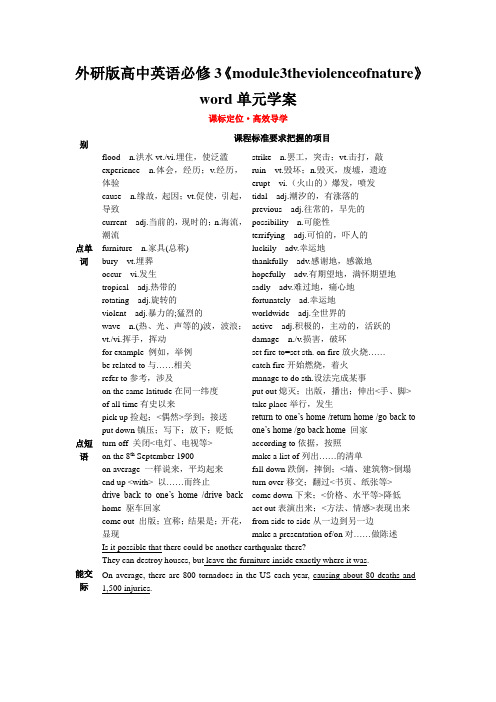
外研版高中英语必修3《module3theviolenceofnature》word单元学案课标定位·高效导学别课程标准要求把握的项目点单词flood n.洪水vt./vi.埋住,使泛滥experience n.体会,经历;v.经历,体验cause n.缘故,起因;vt.促使,引起,导致current adj.当前的,现时的;n.海流,潮流furniture n.家具(总称)bury vt.埋葬occur vi.发生tropical adj.热带的rotating adj.旋转的violent adj.暴力的;猛烈的wave n.(热、光、声等的)波,波浪;vt./vi.挥手,挥动strike n.罢工,突击;vt.击打,敲ruin vt.毁坏;n.毁灭,废墟,遗迹erupt vi.(火山的)爆发,喷发tidal adj.潮汐的,有涨落的previous adj.往常的,早先的possibility n.可能性terrifying adj.可怕的,吓人的luckily adv.幸运地thankfully adv.感谢地,感激地hopefully adv.有期望地,满怀期望地sadly adv.难过地,痛心地fortunately ad.幸运地worldwide adj.全世界的active adj.积极的,主动的,活跃的damage n./v.损害,破坏点短语for example 例如,举例be related to与……相关refer to参考,涉及on the same latitude在同一纬度of all time有史以来pick up捡起;<偶然>学到;接送put down镇压;写下;放下;贬低turn off 关闭<电灯、电视等>on the 8th September 1900on average 一样说来,平均起来end up <with> 以……而终止drive back to one’s home /drive backhome 驱车回家come out 出版;宣称;结果是;开花,显现set fire to=set sth. on fire放火烧……catch fire开始燃烧,着火manage to do sth.设法完成某事put out熄灭;出版,播出;伸出<手、脚>take place举行,发生return to one’s home /return home /go back toone’s home /go back home 回家according to依据,按照make a list of列出……的清单fall down跌倒,摔倒;<墙、建筑物>倒塌turn over移交;翻过<书页、纸张等>come down下来;<价格、水平等>降低act out表演出来;<方法、情感>表现出来from side to side从一边到另一边make a presentation of/on对……做陈述能交际Is it possible that there could be another earthquake there?They can destroy houses, but leave the furniture inside exactly where it was.On average, there are 800 tornadoes in the US each year, causing about 80 deaths and 1,500 injuries.法The past perfect passiveBy the time the tornado ended, morethan 700 people had been killed.Indirect speech“I’m still working because there is a lot todo.”→He said that he was still working becausethere was a lot to do.SectionⅠIntroduction, Reading and Vocabulary &Function知识整合·能力聚焦考点搜索1:happen的用法【例1】This is the best thing that has ever __________ me.A. happened toB. took placeC. occurredD. cared about解析:考查动词辨析:happen to sb./sth.情况发生在……身上;临到……头上;take place(尤指通过打算或安排后)发生,举行;occur发生(正式用语,既能够指“突发性”,又可指“打算性”的发生);come about 发生,产生(尤指不受操纵地发生,常与how连用);选项B、C、D均为不及物动词,其后不可接宾语。
外研版必修三.Module-3The-Violence-of-Nature备课资料
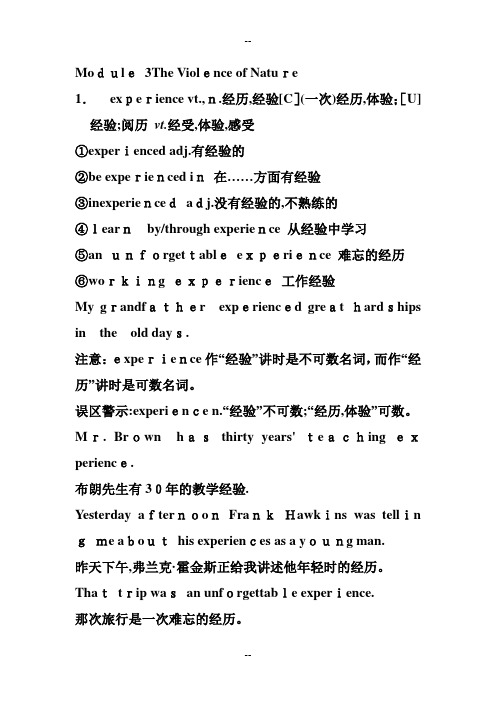
Module3The Violence of Nature1.experience vt.,n.经历,经验[C](一次)经历,体验;[U]经验;阅历vt.经受,体验,感受①experienced adj.有经验的②be experienced in在……方面有经验③inexperiencedadj.没有经验的,不熟练的④learnby/through experience 从经验中学习⑤an unforgettableexperience 难忘的经历⑥working experience工作经验My grandfather experienced great hardships in the old days.注意:experience作“经验”讲时是不可数名词,而作“经历”讲时是可数名词。
误区警示:experience n.“经验”不可数;“经历,体验”可数。
Mr. Brown hasthirty years' teaching experience.布朗先生有30年的教学经验.Yesterday afternoonFrankHawkins was tellin gme abouthis experiences as a young man.昨天下午,弗兰克·霍金斯正给我讲述他年轻时的经历。
Thattrip wasan unforgettable experience.那次旅行是一次难忘的经历。
Ilearned more from experiencethan fromreading books.我从实践中学到的比从书本上学到的更多。
朗文在线:①Thejob requires no secretarialexperience.这个职位无需秘书工作的经验。
②In my experience, thesethings neverlast very long.从我的经验来看,这些事情从未长久过。
- 1、下载文档前请自行甄别文档内容的完整性,平台不提供额外的编辑、内容补充、找答案等附加服务。
- 2、"仅部分预览"的文档,不可在线预览部分如存在完整性等问题,可反馈申请退款(可完整预览的文档不适用该条件!)。
- 3、如文档侵犯您的权益,请联系客服反馈,我们会尽快为您处理(人工客服工作时间:9:00-18:30)。
外研版高中英语必修三词汇强化练习Module3The violence of nature根据首字母、词性、及英语解释写出正确的单词或短语1.d______________n.a sudden event that causes great damage or loss of life.2.e______________n.a sudden and violent shaking of the ground,sometimes causing great destruction3.c______________n.a body of water or air moving in a definite direction4.w______________adj.extending or reaching throughout the world.5.d______________v.cause physical harm on(something)so as to reduce its value6.b______________v.put or hide under ground7.p______________adj.existing or occurring before in time or order.8.e______________v.(of a volcano)become active and eject lava,ash,and gases.9.o______________v.happen;take place10.e______________v.encounter or go through(an event or occurrence).根据汉义补全句子,每题1分1.T he river will__________(淹没)if it gets much worse.2.They bear the cost of droughts,__________(洪水),and trade barriers into Europe.3.There was always the__________(可能性)that he might be turned down.4.These__________(热带的)flowers have bright colors.5.The lunch with him had turned out to be a total__________(灾难).6.The__________(飓风)caused a surge of water that flooded large areas of the historic city center.7.These were living,breathing souls who could__________(经历)pain and emotions just as well as we can!8.The news of the radiation leak caused__________(全世界的)public alarm.9.The temple is supported by massive__________(柱子).10.The__________(水流)is deep and strong down the stream.11.A chair and a table were the only__________(家具)in the room.12.Billy goes home and prepares a box__________(掩埋)his old dog in.13.Brazil is the fifth largest country in the world and spans both sides of the__________(赤道),making it both anorthern and a southern hemisphere destination.14.In__________(旋转),the shaft(轴)splashes oil up into the bearings(轴承).15.__________(暴力的)criminals like that are dangers to society.16.He said the disease__________(袭击)his farm two months previously and very soon afterwards no rabbitswere spotted.17.He could hear the gentle wash of__________(波浪)on the shore.18.She said there had been regular drug dealing in the__________(墓地).19.Her nervousness threatens__________(毁坏)the whole idea.20.The next day,the island's volcano__________(喷发)and an__________(地震)follows.21.She could not remember,in fact,very well what had happened the__________(以前的)evening.22.The most__________(吓人的)aspect of nuclear bombing is radiation.23.But without any__________(警告),Mount Vesuvius roared to life.24.The story has attracted__________(全世界的)attention.25.Vesuvius is an__________(活跃的)volcano.26.Knowing all this,they made me pay for the__________(损失).27.These symptoms can__________(发生)with many diseases.用所给单词的适当形式补全句子,每题1分1.There is very____________(possible)all river life would be killed off for generations.2.You are probably____________(bury)in letters from people who are eager to spend money on this new film.3.It is unthinkable that we shall allow a nuclear holocaust____________(occur).4.I cannot imagine that these two____________(occur)are isolated incidents.5.A robber who used a fake gun____________(terrify)a shop assistant,causing an armed police hunt,has beenjailed for six years.6.And____________(thankful)I did not lose anyone in the attacks.7.____________(hopeful)he too can come back,and play like he did at Dallas.8.____________(fortunate),there was no casualty as nobody was at home when the fire broke out.9.____________(fortunate)there was a power failure at the cinema.10.Both goals were reached but____________(sad)he would not see it happen.11.Buildings shook____________(violent)in the earthquake.12.By the time it ended,more than700people___________(kill)and2,700injured.13.The truck___________(strike)by lightning and had a hole ripped out of its roof.14.They___________(put)out the fire before I returned to the village.15.We went to live in another town after the tornado____________(destroy)our house.用方框中所给的单词或短语填入句子中,注意有一个选项是多于的。
A.occurB.causedC.UnfortunatelyD.breathlessE.columnF.ruinedG.worldwide H.impossible I.eruption titude K.damage1.Friction against the rock,combined with the weight of the climber,____________caused his rope to break.2.He used to write a____________column for this newspaper.2.Food shortage often____________occur in times of war.4.He____________ruined his prospects by carelessness.5.The company has____________worldwide distribution channels.6.____________Unfortunately,most youths as the loyal fans of these superstars have not realized it.7.It's____________impossible to predict the eventual outcome of the competition.8.The violent____________eruption killed1,700people.9.Fires caused by the California Earthquake did the most___________.10.The higher the____________latitude,the colder the weather.答案根据首字母、词性、及英语解释写出正确的单词或短语1.disaster2.earthquake3.current4.worldwide5.damage6.bury7.previous8.erupt9.occur 10.experience根据汉义补全句子,每题1分1.flood2.floods3.possibility4.tropical5.disaster6.hurricane7.experience8.worldwide9.columns 10.current11.furniture12.to bury13.equator14.rotating15.Violent16.had struck17.waves18.cemetery19.to ruin20.erupts,earthquake21.previous22.terrifying23.warning24.worldwide25.active26.damage27.occur用所给单词的适当形式补全句子,每题1分1.possibility2.buried3.to occur4.occurrences5.to terrify6.thankfully7.Hopefully8.Fortunately9.Unfortunately10.sadly11.violently12.had been killed13.was struck14.had put15.had destroyed解析1.极有可能所有河流生物将会有好几代都会被毁灭。
